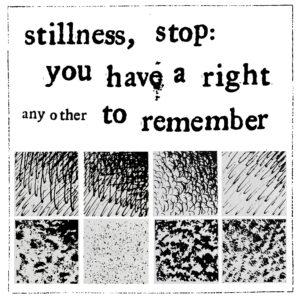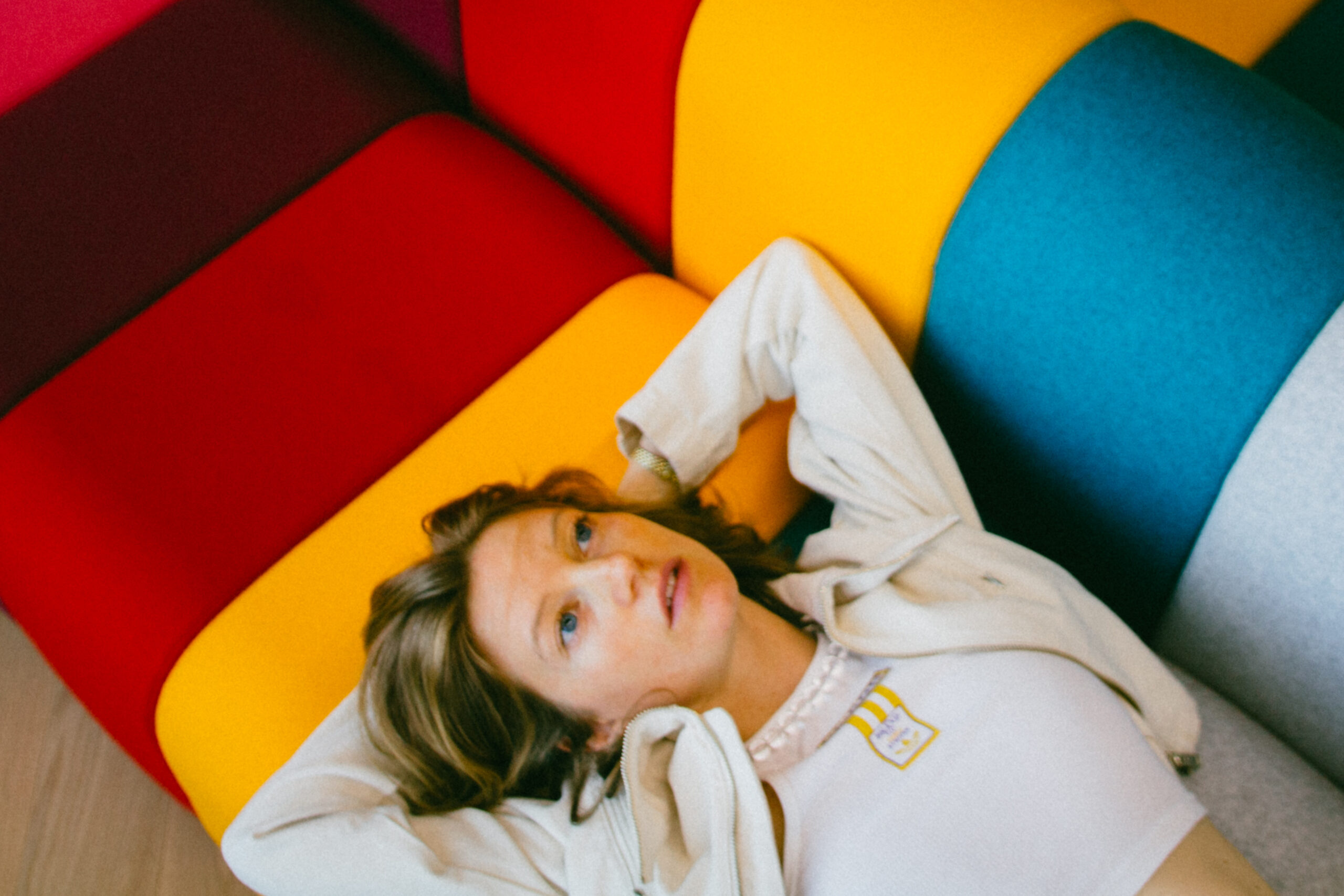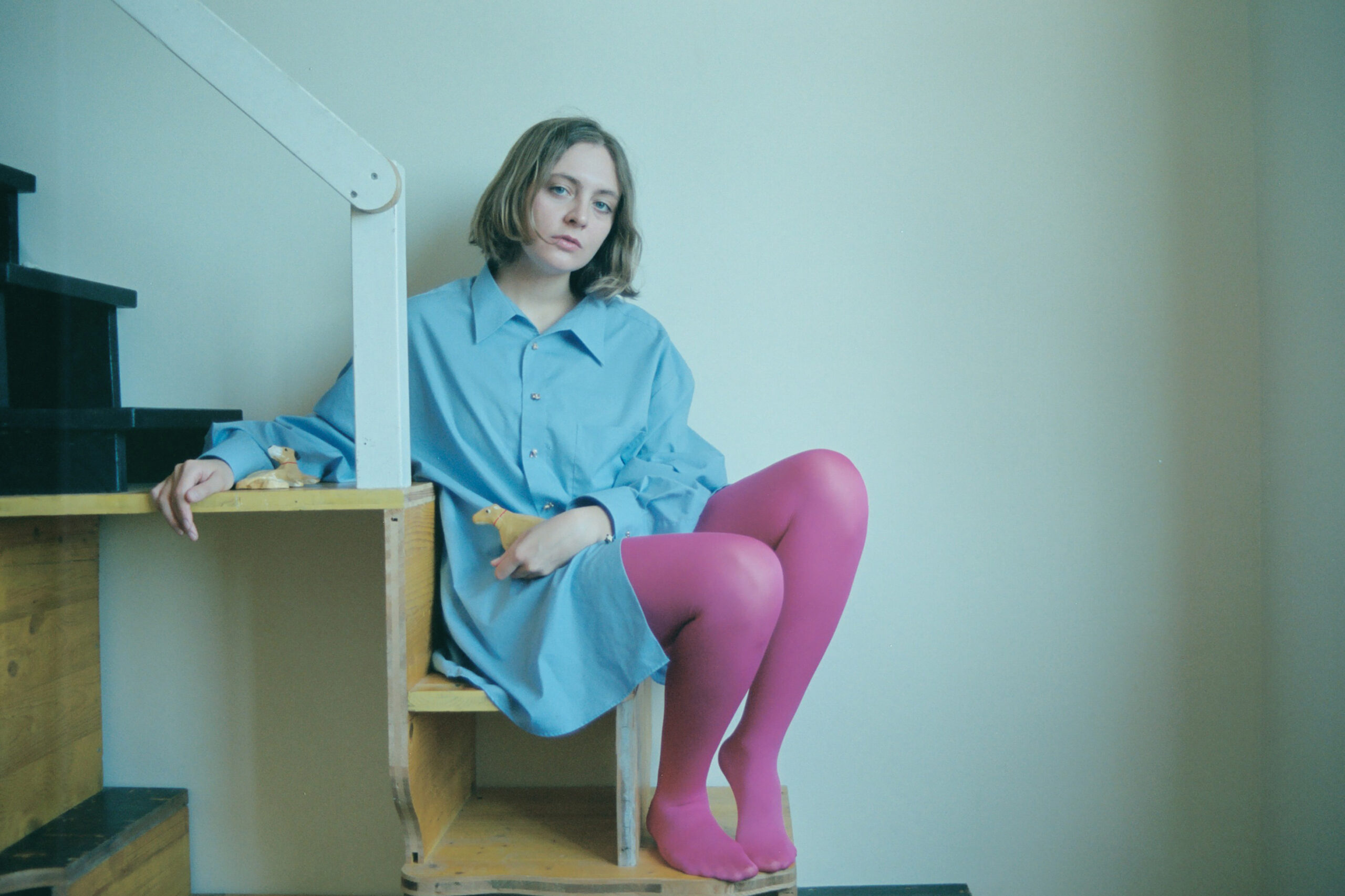Foto-© Ludovica De Santis
Adele Altro veröffentlichte am zuletzt das bereits dritte Album stillness, stop: you have a right to remember als Any Other via 42 Records. Das Album wurde im Januar 2023 in einem Studio in Mailand aufgenommen und gemeinsam mit Marco Giudici produziert. Es ermutigt die Hörer:innen, ihre eigenen Komplexitäten zu erforschen und Trost in der gemeinsamen menschlichen Erfahrung zu finden.
Über die Herausforderungen und Schönheiten der Zusammenarbeit mit dem besten Freund sprechen wir mit Altro im Zoom-Interview Ende Dezember. Altro reflektiert den Prozess als eine persönliche Reise der Selbstfindung und der Auseinandersetzung mit der Erkenntnis, dass selbst traumatische Erinnerungen mehrdimensional sein dürfen. Im Gespräch über so grundlegende Themen wie Familie, Freundschaft und Identität, die auf dem Album behandelt werden, betont Altro die Bedeutung von Authentizität und dem Wunsch nach Verbundenheit als persönliche Triebfedern des künstlerischen Schaffens. Altro spricht auch über die Herausforderungen als nicht-binäre Person in der Musikindustrie, und warum Italien in dieser Hinsicht rückständiger ist als viele andere Länder.
 Congratulations on your new album stillness, stop: you have a right to remember. You recorded it almost a year ago. From a listener’s point of view that sounds very long. What memories do you have from that process that still stick?
Congratulations on your new album stillness, stop: you have a right to remember. You recorded it almost a year ago. From a listener’s point of view that sounds very long. What memories do you have from that process that still stick?
It is a long time for me as well. A lot of things happened in the middle of the process and you realize it at the end. I wrote the first parts of the songs in 2015. That was a long time ago. I mostly produced and recorded it in January 2023 and it was a messy time for me. The relationship I was in was pretty rough and there was a lot going on in my life. I remember being in the studio every day with my best friend because we were making it together. That was the thing that got me through it. I realized after that I was really hanging on to it. I remember eating a lot of focaccias.
You produced it with your best friend Marco Guidici at a rough time in your life. Being with someone in a work process but also having no boundaries to your personal life and feelings sounds very intense.
It was very intense. There were times when we stopped to think if this was the best way to do it. I remember crying in the studio first thing in the morning because my partner and I had a fight or something. We took 30 minutes to talk about it and then we talked about his stuff too. Like you said, there are less boundaries when you are with your best friend. This is a good thing, but sometimes it was hard to manage while working. But I also feel like it put us both in a position where we could express how we felt no matter what. Which is something you cannot always do when you are doing your job. But it can also be frustrating. It was a lot. But at the end of the day, we were happy that we did it that way. It felt like the right thing to do. I do not think I could have done it with anyone else, honestly.
You started writing some of the things 2015, when or how did you decide that you are ready? Or was it practical reasons like a contract you had to fulfil?
It was for practical reasons, but not because of a contract or anything like that. It was more like my last record as “any other” came out in 2018, which is almost six years ago. And we went through the pandemic, and I was only working for other people. The main reason was that I needed to work for myself for a little bit, so I had to make this record. My last tour ended in 2019, right before Covid. There was a part of me that I could not experience during and after the pandemic. In Italy I work a lot for other artists as a session musician, as a producer and so on. I missed my life as a main artist, I felt the need to reconnect with that part of myself. That was the main reason.
This is your third album. Is there anything that feels like a routine, is there anything you learned before that you can use now, or is every process new?
Every process is new. I am 29 years old and I started this job almost ten years ago. I have grown up and that is the main reason why each time has been different. I feel like for the first ten years I had to create a personality for myself. I did other records and stuff, but I did not know myself as a musician. I did not feel like I had my own way of making music. I feel like from now on there will be some more recognizable ways for me to do it.
 Let us dive into the content and start at the title. You make an album full of music and the first words are “stillness, stop”. And then “you have a right to remember” foreshadows the record. What is the core element of the album for you?
Let us dive into the content and start at the title. You make an album full of music and the first words are “stillness, stop”. And then “you have a right to remember” foreshadows the record. What is the core element of the album for you?
Somehow the title came before a lot of songs. It was a feeling I had in the last few years. Especially after the pandemic, but also before, I always had the feeling that my life was in a rush. My life in a general sense, my job and my relationships, but especially internally. In the last 20 years I have gone through depression, anxiety, and mental illness of various kinds. I am a big overthinker, so sometimes I get stuck in the middle of things. It is not actively being stuck, it is something that you experience in a passive way, where your mind just goes on and on and on, never allowing you to rest. After going to therapy and working on my mental health, I felt like I could let myself be still for a moment because I chose to, not because it just happened to me. With that came the second part of the title: you have a right to remember. I realized that I tend to forget a lot of things that have happened to me, especially because of trauma and bad experiences. But I also realized that when you go through trauma, you tend to forget not only the bad things, but the good things as well. That is something that did not sit right with me. Especially with toxic relationships, romantic relationships, relationships with your family, with your friends, with yourself and your gender and your identity, it is not black and white in my life. Even and especially with the people who have hurt me the most. Some of them are also the people who have given me the most. They were also part of the good memories. For example, my relationship with my father is very difficult, but I realized that it is not only about that. I lost a lot of memories because of that, and at some point that was only a part of my reality. It was not my whole reality. I have the right to remember the good things. It is not like I am going to cut this person out of my life and I am going to be fine. I needed to put the pieces together and I feel like that is the core theme of the record. It is about family, and it is about friends and as I said, gender identity too. That is something I have been processing a lot in the last years.
In music, memories are often something nostalgic, positive – thinking about the good days. That is why your album really spoke to me, because it is different. I feel like this is a really communal aspect that gives people a lot. Is that a feedback you got?
It is feedback that I have gotten over the years. People coming up to me after shows or texting me on Instagram or stuff like that and saying, “Thank you. I went through that too. It made me feel less lonely.” I don’t mean for people to understand my point of view, but for me music is something that is there to make connections. So when people tell me that they feel less lonely because of something I did, that is the most amazing thing to me. One of the main reasons I make music is that I have felt lonely my entire life and music has really helped me get through things. Especially when I was a teenager and in my early 20s, before therapy. When people tell me that the music I make has helped them in a similar way, it is really beautiful.

It is amazing that art can do that and that you can do that for people. As you said, you have dealt with all the elementary themes of life: friendship, parents, gender and identity. Have you ever hesitated to talk about it publicly or to put it all together on a record? So you have to face these things all the time, whether you want to or not, and make it public for other people, which can have a very good and connective side. But it also means that you have to talk about it, like with me right now. Have you ever considered just not doing it?
Not really. Around 2020, when the pandemic started, I had been touring for years and had not stopped. And when the pandemic hit, I thought, who am I without this? At that point in my life, I had to put a limit on myself, because I cannot identify 100% with what I do, because that would be hard to bear. Before the pandemic, I wanted to give everything. During the pandemic I was like, “I’m not going to give at all.” Now I am in the middle. I do not tend to go into details, but at the same time I know that we all feel these kinds of emotions. It feels dishonest to me not to say it.
Well, you could make music about less personal topics. It is still a choice.
I am not able to. It comes from what I need in the first place. Like I said, I need to make connections. So I tend to do that. Not around the things that are bad for us, but for me transparency is really important. This is something that made me feel bad growing up because I always felt like I did not have the space or the community to talk about my mental health, my gender identity, my sexual orientation and things like that. I used to feel really lonely and I do not want to feel that way anymore.
I guess the music industry can make you feel lonely too. We talked about gender and gender identity and how you created a safe space for yourself to express your feelings. Yet it is still an industry that is predominantly cis, male, white, heterosexual. What is your perspective on that? Do you feel like things are changing? What is it like for you to be in this industry as the person you are?
I feel that I have to make a distinction. I am in Italy and Italy is in Europe. But it is a fascist country. And people in the music industry, they do not know much about this stuff. I feel like I have to deal with a music industry here in Italy and a different kind of music industry outside of Italy. Here the situation is changing a little bit, but it is the slowest process ever. For example, I am non-binary and 90% of the people I work with do not even know what that is. A lot of times they are like, “Oh, you’re the woman of the group,” and I am like, “Yeah, yeah, yeah,” just because they do not know what you are talking about. It is so weird when my press is written abroad, I get “they/them” pronouns. For me, looking abroad is like, “Oh, this is so much better. But there is room to grow everywhere. I guess it is never enough. There are still racist and homophobic jokes here. So you think, “Okay, well, I have to pay the rent, so I will be here anyway”. But there is always something else you can do. I do not feel like we are at a good point in the music industry at all. But I feel like even if it is really slow, it is still getting better. I am not positive about the present, but I am positive about the future. I remember when I was a teenager I used to get slurs and now I do not. Based on my experience, it is getting a little better. I know it is not in a general way, but at least you can build communities. I feel like that is not something you could do a some years ago.
Thank you for the interview!
Any Other Tour:
12.04.24 München, Heppel & Ettlich
13.04.24 Darmstadt, Bedroomdisco Kirchenkonzert
14.04.24 Köln, Bumann & SOHN
15.04.24 Berlin, Kantine am Berghain
16.04.24 Hamburg, Die Hebebühne
18.04.24 Hannover, Feinkostlampe










